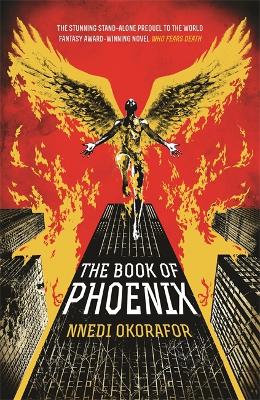Let all that was written be rewritten.
4.5 stars
I have nothing but praise for this book. It seems I will be unable to delay my deep dive into sci-fi (and possibly sci-fantasy) any longer and you know what, I’m excited if this is the kind of work I have ahead of me.
I love books. I adore everything about them. I love the feel of the pages on my fingertips. They are light enough to carry, yet so heavy with worlds and ideas.
I struggled to get into the book for the first few chapters (and I’ll get into why I gave it a .5 rating in a little) but the rest of it was well worth the wait with a powerful message about overcoming both external and internalised oppression, compelling characters and solid prose.
For this review, I’m actually going to do something a little different because Ani, goddess of the sun, comes up every now and then (and we all know how I enjoy fictional religions) and there's a story of her having pulled down the sun on her chosen people when they defied her while she rested after creation.
THE LIGHT:
1. Characterisation
-Phoenix: the literal definition of a strong woman who will stop at nothing to achieve her goals
*her path is riddled with obstacles many of them in the form of insecurities and difficult choices but she overcomes them all to give The Big Eye (a bio-modification company) a piece of her mind
-Saeed: agitates for change and when he sees the true horror of The Big Eye (TBE) he takes his life
*always calm and level-headed
*willing to do anything for those he loves
-Mmuo: a hero in the land he hails from (Nigeria) but very mysterious and brooding, doesn’t like to relive up the past
*he’s the one character I would have liked to know more about (more than what we learned in that one flashback scene)
*oh and he can walk through walls
Human beings make terrible gods.
2. World-building
-as I mentioned before, this book has sci-fi elements in it and though I’ve barely dabbled in the genre, I had no difficulty understanding anything (except that bit in the last few pages about extracting).
-Okorafor weaves these elements seamlessly into her story until they’re as normal to you as breathing.
3. Plot
-Phoenix lives in Tower 7 of TBE with an assortment of other people and creatures who have developed unusual abilities – or who had them when they were captured. Here they’re subjected to experiments by scientists working for the TBE (note: all these people are either of African descent or people of colour).
-however, Saeed dies by suicide one day and this triggers a response from her and a radical shift in her manner of thinking (I’ve recently mentioned the concept of fridging in a review but unfortunately, to explain why this is not that would bring up a spoiler so I won’t).
-basically, the plot is very straightforward and easy to follow
I speak my life into existence with each expressed breath I take. I tell you a story within which are more stories. Universes within universes. We are all spinning like small suns. I am like my own sun.
4. Representation
-this is a book about African people that does not limit itself to one country or culture and that for me deserves a mention.
To know someone's pain is to share in it. And to share in it is to relieve some of it.
THE SHADOWS:
5. Writing style
-I mentioned that the prose was solid and I stand by that but something else about the writing – something I’m not sure Okorafor did purposefully – was what nagged at me: the absence of contractions.
-this might seem like nit-picking but I find it difficult to read books without contractions because it makes me pause while reading and makes the dialogue sound awkward (very few people speak that way).
-I will say, however, that she held to the rule of contractions admirably: “either use them or don’t”
*back and forth tends to be even more distracting.
Summary: read this book, thank me later.
(actually, thank Ani goddess of the sun, but make sure to put in a good word for me)
